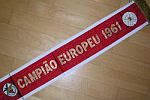Em 1996 Portugal voltou aos grandes palcos após 10 anos de ausência. Foi uma fase de qualificação quase perfeita, com apenas uma derrota e sete vitórias em dez jogos. Apesar de não entrarem no lote dos favoritos, vários dos jogadores ja se tinham sagrado Campeões Mundias Sub20 em 1991. A fase de grupos então terminamos em primeiro lugar, e a partir de aí ja se via que Portugal tinha uma excelente equipa que podia ir longe. Nos quartos finais defrontamos a Républica Checa, que tinha uma das estrelas do futebol mundial entre os seus. Karel Poborsky foi o único que marcou nesse dia. Foi um golo de chapeu que conseguiu superar a nossa defesa, num jogo que de resto foi bastante táctico e não permitiu criar muitas oportunidades de golo.
A camisola apresentada foi vestida por Oceano Cruz durante o Euro 1996. Nascido a dia 29 de Julho 1962 os pais emigraram para Portugal, vindo de Cabo Verde, quando era crianca. Iniciou a sua carreira em Almada, onde completou a sua formação. Depois de algumas estações, chegou ao Sporting em 1984 onde atuou como médio defensivo e logo se impôs á concorrência devido á sua capacidade física e sua visão de jogo. Durante sete anos disputou mais de 200 jogos para os leões, antes de seguir o caminho do seu antigo treinador John Toshack para os Real Sociedad. Permaneceu lá durante três épocas, igualmente como titular, antes de regressar ao Sporting em 1994. Voltou a alinhar mais de 100 vezes pelo clube, antes de ir para o FC Toulouse em 1998, onde também terminou a sua carreira como futebolista em 1999.
Foi internacional português 54 vezes, marcando oito golos.
Mais tarde escolheu tornar-se treinador e foi técnico dos Sub21 de Portugal ou do Sporting B, entre outros.
Uma palavra sobre o fornecedor: A Olympic tinha se tornado fornecedora de Portugal em 1995. No fim de 1996 Portugal tinha recebido uma oferta pela Nike e rompeu contrato com a Olympic. Esse caso foi a tribunal e demorou até 2016 para chegar a um acordo, quando o Supremo Tribunal deu razão á empresa Ricoexport, que representava a Olympic em Portugal. O valor da indemnização é desconhecido.
It was in 1996 that Portugal managed to qualify for a major tournament after 10 years of abscence (12 if looking at the last time Portugal played an European Championship). The qualifiers were pretty good with only one loss and two draws in 10 matches. While not being one of the favourites to win the title, Portugal had a few of the players that won the 1991 U20 WC in their squad. After ending first in the group phase, the public noticed that there could be surprise arising. In the quarters we met the Czech Republic, that had one of the superstars of that period in their team. Karel Poborsky was the only one that scored that day. With a lob he managed to overcome our defense, in a match that was pretty tactical and where the teams couldn`t create many opportunities to score.
This shirt was worn by Oceano Cruz, born on 29th of July 1962, during the tournament. Son of immigrants who left Cape Verde during his childhood, he started playing at Almada. After short spells at different teams he was signed by Sporting CP in 1984 where he played as defensive midfielder. It didn`t take long to earn his spot in the starting lineup and becoming one of the fundamental players of an era. His physical strength and leadership skills were essential in his role.
After more that 200 matches for the "lions" in 1991 he followed his former coach John Toshack to Real Sociedad, where he became as important, and played three successful seasons. Then in 1994 he returned to Sporting, adding another 100+ matches to his CV before moving to Toulouse in 1998, and ending his carreer one year later.
After this he coached Portugal Junior teams and also the second team of Sportingy amongst others.
He was called to represent Portugal in 54 ocasions, scoring 8 goals.
Jogo/ match: Euro 1996
Fornecedor/ outfitter: Olympic













